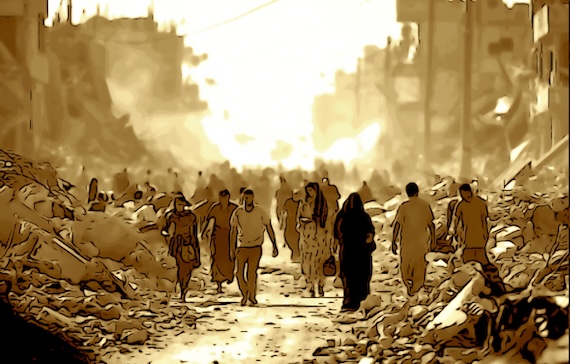In the face of relentless war and displacement, Palestinians find strength in solidarity, transforming loss into resilience
By Omar Shahin
( Globalvoices.org ) – In the face of the relentless war and destruction unleashed by Israel in Gaza, displaced Palestinians have developed a remarkable array of coping and adaptation mechanisms. These strategies, deeply embedded in cultural and social values, reflect an enduring resilience and a strong sense of community solidarity. Against the backdrop of loss and upheaval, these mechanisms have enabled individuals to navigate the harsh realities of displacement, achieving psychological and social stability even in the most trying circumstances.
Finding strength in social bonds
Some of the real-life stories of displaced Palestinians I witnessed working as a consultant in mental health and psychotherapy in Gaza illustrate the remarkable resilience and resourcefulness of individuals in the face of adversity.
Displacement often strips individuals of their homes, livelihoods, and familiar surroundings, leaving a void that is often filled by the support of family, friends, and the broader community. This network of social support provides a vital sense of security and belonging, helping to mitigate feelings of isolation and despair. Displaced Palestinians often lean on these relationships, drawing strength and comfort from the collective effort to endure.
Umm Ahmad, a mother of five who lost her home and was forced into a temporary shelter, refused to succumb to despair. She took the initiative to organize community activities, helping other women coordinate psychological support sessions, childcare, and shared responsibilities. Her efforts not only allowed her to adapt to her new reality but also inspired others to find strength in solidarity.
For many, reframing their reality becomes another cornerstone of survival. By focusing on aspects of life they can control and honing new skills to address their challenges, individuals adapt with a sense of purpose and agency.
Sami, a university student, refused to let the conflict derail his education. Unable to continue his formal studies, he turned to online courses, learning programming and graphic design. These new skills opened alternative opportunities, demonstrating how self-development can be a powerful coping mechanism.
Solidarity in action
Religious and spiritual practices also play a pivotal role, offering psychological comfort and a wellspring of resilience through faith and rituals. These practices anchor individuals, providing them with a sense of hope and endurance.
The spirit of community solidarity shines through in collective initiatives that bring displaced individuals together. Volunteer groups often form to support those in need, from distributing aid to organizing childcare and shared meals. Rebuilding social bonds within host communities becomes essential as displaced people forge new relationships to ease their integration and adaptation.
Yousef, a young man in his twenties, faced the double blow of displacement and unemployment. Instead of retreating into isolation, he joined local relief teams, distributing aid and assisting the elderly. This volunteer work gave him a renewed sense of purpose, transforming his role from victim to active contributor within his community.
“Surviving Gaza,” Digital, Midjourney / Clip2Comic, 2024
Cultural and recreational activities also emerge as powerful tools for coping. These activities not only provide much-needed stress relief but also preserve cultural identity, fostering continuity and stability in an otherwise unstable existence. Through traditional crafts, music, or storytelling, displaced Palestinians maintain a connection to their heritage, drawing strength from the familiar.
For Hajja Khadija, an elderly woman uprooted from her village, solace came in the form of traditional Palestinian embroidery. Her craft not only helped her cope with the psychological stress of displacement but also provided a modest income. By teaching other displaced women this art form, she reinforced a sense of identity and solidarity among those around her.
Persistent challenges
Despite these inspiring examples, displaced Palestinians face a multitude of challenges that complicate their efforts to adapt. Economic pressures loom large, as limited financial resources and job opportunities make it difficult to meet basic needs. Psychological stress — stemming from constant fear, anxiety, and instability — takes a heavy toll on mental health. Adapting to new environments presents further hurdles, particularly when the cultural and social landscape differs significantly from what individuals are accustomed to.
The resilience of displaced Palestinians underscores the importance of fostering supportive environments that amplify these coping mechanisms. Community and governmental institutions play a critical role in providing psychological and social support, creating conditions for sustainable stability. From ensuring access to education and healthcare to supporting cultural preservation, these efforts can make a significant difference in mitigating the negative effects of displacement.
Laila, a mother of two, initially felt overwhelmed by the chaos of displacement. Finding refuge in the support of her family, she established a simple daily routine to provide stability for her children. Her efforts created a sense of normalcy amid uncertainty, illustrating the importance of family cohesion in weathering crises.
Ultimately, the strength of displaced Palestinians lies in their rich cultural heritage and the solidarity that binds their communities together. Their stories are a testament to the human capacity for adaptation and survival, even under the most difficult circumstances. By recognizing and supporting these efforts, the broader global community can contribute to a future where resilience is matched by opportunity and stability.
Omar Shahin is a mental health and psychotherapy specialist currently based in Gaza.




 © 2025 All Rights Reserved
© 2025 All Rights Reserved